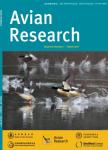Mild spring temperature rising affects the anti-oxidation and immune functions of Asian Short-toed Larks
Mild spring temperature rising affects the anti-oxidation and immune functions of Asian Short-toed Larks作者机构:College of Life and Environment SciencesMinzu University of ChinaBeijing 100081China Ministry of Education Key Laboratory for Ecology of Tropical IslandsCollege of Life SciencesHainan Normal UniversityHaikou 571158China.
出 版 物:《Avian Research》 (鸟类学研究(英文版))
年 卷 期:2020年第11卷第2期
页 面:115-121页
核心收录:
基 金:supported by the National Natural Science Foundation of China(No.31872246)
主 题:Mild temperature rising Anti-oxidant capacity Immunity Asian Short-toed Larks Spring
摘 要:Background:Predicting the possibility of severe effects of global warming on animals is important for understanding the ecological consequences of climate change on *** is the season during which birds have to physiologically prepare for the subsequent breeding period,and unusual spring temperature rising probably becomes a heat stress to the birds which have adapted to the low spring ***,it is necessary to understand the physiological effect of spring warming on the temperate ***:Using the activities of blood anti-oxidative enzymes(SOD,CAT,GPx)and the concentrations of serum immunogloblins(IgA,IgY,IgM)as indicators,we compared the anti-oxidative and immune functions of Asian Shorttoed Larks(Calandrella cheleensis)captured between 10 and 15 March,2015 and housed under conditions of 21°C and 16°***:The SOD activities of birds in 21°C group were significantly lower than those in 16°C group on all the treatment *** CAT activities of the birds in 21°C group were significantly lower than those in 16°C group on the 1 st,5 th,13 th,17 treatment *** GPx activities of the birds in 21°C group were signifthicantly lower than those in 16°C group on the 1 st,13 th and 17 th,but significantly higher on the 21 st treatment *** IgA,IgY and IgM concentrations of birds in 21°C group were significantly lower than those in 16°C group on all the treatment ***:This study shows that spring temperature rising negatively influences antioxibative and humoral immune functions,which indicates that spring climate warming might reduce the fitness of the temperate passerine birds which have adapted to the low spring temperature.



